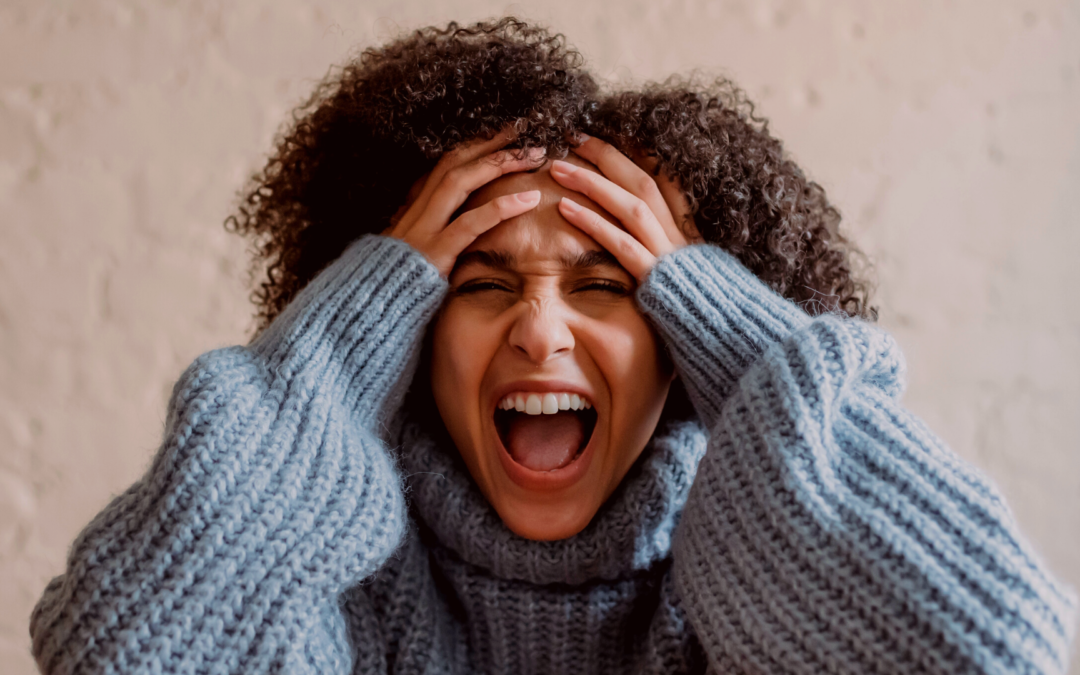If you find yourself feeling a sudden overwhelming fear of a loss of control or death, shortness of breath, and your heart is beating fast. You may be experiencing a panic attack. First things first, take a step back, release your shoulders from your ears, unclench your jaw, and drop your tongue from the roof of your mouth.
Do you feel better?
Let’s think about what a panic attack feels like; you may feel an impending sense of doom or danger. It’s an intense fear of loss, or control, or even death. Your heart rate becomes rapid, your blood pressure through the roof, and you may even feel a pounding in your head. As a result, you’ll feel short of breath and have a tightness in your throat. Sometimes you might experience trembling and shaking. These are the most common signs of a panic attack. You can experience physical symptoms like chills or hot flashes, even experience nausea, abdominal cramping, chest pain, and a headache. Dizziness or feeling faint usually accompany a panic attack, and you’re also likely to feel a numbness or tingling sensation. As a way to cope, you might feel detached or have a sense of unreality.
The worst thing about a panic attack is, you assume different things are wrong with you. You might think it’s a heart attack because you feel your life flashed before you. Or you think it’s another life-threatening issue. That’s part of the problem of a cycle of overthinking that can get worse with each minute. Most people are unaware of how overthinking can make your panic attack worse. That’s why you need to practice mindfulness and other techniques to bring yourself to the present. It is tough but when you are able to spot a panic attack coming on, and you practice the proper remedial actions, you’ll be able to stop it in its tracks. You’ll be surprised how community, support, and practices can help you avoid a panic attack.
Humans were created with a fight or flight mechanism. Simply means that when in the face of danger, you would stand and fight the threat or you would run away. As times have changed, especially for people living in cities this response has translated into a mental manifestation. Your adrenalin is kicking in because your mind is telling you that you are in danger when you really are not. Based on what your natural instincts are, you may feel a few different variations of this response. For example, if you are a fighter, you would feel muscles tensing just like you would before a fight. If you are a runner, you may feel a cold chilling sensation just like you are running away from let’s say a wild animal. One more response that is usually overlooked is the freeze response. You may experience trembling without much control of your body. No matter what it is, know that you will be okay. You just need to put into practice a few common actions that will help you manage and eventually rid you of this feeling.
Here’s what you can do if you’re experiencing a panic attack:
1. Take Deep Breaths
This is one of the most common but effective suggestions you will find online. Hyperventilating during a panic attack can make you more afraid. So try to remember to take deep controlled breaths. Do the opposite of what you’re feeling and take slow deep breaths to get your heart rate down. Once you get your breathing under control, you cut off the chances of making the other symptoms worse, and you’re closer to feeling better. Try to bring your focus to something tangible like your breath, follow it all the way through to your stomach. Notice the air filling your lungs and the movement of your chest as you exhale, notice other body contractions, examine your body, and stay in the present. Try to count your breaths to take your thoughts away from what triggered your panic attack in the first place.
2. Spot Your Panic Attack
Once you recognize that you’re experiencing a panic attack, you can remind yourself that it’s temporary and part of the fear from overthinking. It will help you focus on other techniques to stop your panic attack. A simple yet difficult remedy is to knock the thought out almost as instantly as it began. For example, you are a hypochondriac, a thought that may have triggered in your head and immediately gives rise to heart palpitations, you may get creative with what’s going to happen next. If you are able to successfully use your mind to say to yourself that ‘It’s only a panic attack building up and I shouldn’t encourage it,’ you will notice the symptoms slowly disappear. It takes practice, but it gets easy after a while. Don’t give up.
3. Close Your Eyes
Sometimes your panic attack can be triggered by your environment. For instance, if you are in a stressful environment, it can make your panic attack worse. You can close your eyes to cut off the stimuli making your panic attack worse and helping you focus on your breathing. Remember to always bring your focus back to your breath, cut out any other thought while your eyes are closed.
4. Find A Focus Object
If closing your eyes doesn’t help, try to focus on a single object in your surrounding. Try to make a mental note about, for example, its appearance, color. If you’re focusing on the clock, notice how to hands give a slight jerk as sit moves. Or the light ticking noise it makes. You can note the patterns or shape of the clock.
5. Practice Muscle Relaxation
As with taking deep breaths, muscle relaxation can help stop your panic attack by controlling your body’s response. Consciously try to relax one muscle at a time, start with your toes and fingers and then relax your whole body slowly. You’re likely to have more success with muscle relaxation techniques if you’ve tried them before. Here’s a video to help you get started.
6. Picture your happy place
Try to think of the most relaxing place you’d like to be – a warm beach with rolling waves or a snowy cabin in the mountains. Now picture yourself there and build on the details like the smell of the earth. Or the sea salt in the air as you dig your feet into the sand. Personally, the sound of rain brings calm to my soul. I put it on and have a conversation with God, who also happens to be my friend. It’s nice to share with someone, especially if it’s as easy and transparent as this.
7. Repeat Your Mantra Internally
My teacher once told me something that helped me through a lot of overthinking and stress. She said, if what you’re worrying about won’t matter in the next five years, don’t spend the next five minutes thinking about it. Beating your panic attack requires you to stay in the present and not worry about what hasn’t happened yet. If you have a mantra that works for you, it could even be Hakuna Matata. Repeat it to yourself till your panic attack subsides. It’s a way to help ground you. Practice affirmations to constantly remind yourself that everything is alright.
8. Keep Lavender With You
Lavender is known to have a soothing effect on anxiety and helps your body relax, relieving stress. If you’re prone to panic attacks, you can keep some lavender essential oil handy. Rub a few drops on your forearm and breathe in the scent when you find yourself experiencing a panic attack. If you can, lavender or chamomile tea is relaxing and soothing and helps with your panic attack.
9. Benzodiazepines (Use only under prescription)
Benzodiazepines are medications approved by the FDA for treating panic attacks. You’ll need a panic disorder diagnosis to use these because they are prescription medication. It’s best to consult your doctor before resorting to medicines because they can be addictive. There are still other ways to stop a panic attack, and you should resort to medication sparingly and in extreme circumstances after consultation. Be wary even when you use it to not go beyond a certain time frame, they are addictive and even harder to come off them.
Apart from tools used in professional treatment, you can ease your panic attack with:
- Epsom salt foot bath – Epsom salt can help ease stress as the magnesium in the salt dissolves and absorbs into your skin. You’ll feel more relaxed, you may start to feel that vibrations and pulsating feeling start to subside and more.
- Lavender essential oil/peppermint oil all mixed along with a carrier oil – lavender oil and peppermint essential oils are helpful to relieve stress and promote relaxation. You can mix them with a carrier oil (any ordinary oil) to make them easier to absorb for your body. I usually just mix a drop of lavender and peppermint together with some carrier oil and rub them together between the palm of my hands and then just inhale directly from my hands.
- Guided meditation – is a preventative measure and helps you reduce stress. You can start with sitting down in a quiet place every day with your legs folded. Try to stay calm and focus on your breathing. You may begin to feel attacked with many thoughts that pull you away from your desire to meditate. Gently push them aside and focus again on your breathing. Take deep breaths and keep your eyes closed and focus on a point in the center of your forehead between your eyes. Bring yourself back to your meditative state when you find yourself drifting with the current of your thoughts. Practice this every day for a few minutes. Start with five minutes and slowly increase it every day till you can comfortably meditate for 20 minutes. You’ll feel a big difference in the way you handle stressful situations. You can try some apps for meditation if you’re struggling to concentrate and need a starting point.
The most important part of dealing with a panic attack is to reach out and talk about it. You can find helpful tips online, but you also need a support system of people around you who know and understand what you’re going through. You’re not alone, and you must remind yourself of that when you experience anxiety or stress. Try to identify triggers and speak to an expert who can help you manage and prevent a panic attack. Most people will find that just a few of the suggestions above are helpful during a panic attack, and you don’t have to do them all. Find out what is most effective for you and stick to those. Remember it may get frustrating because a lot of what you put into practice doesn’t seem to work, but do not measure success with that. Every little action and step you take towards your wellbeing will contribute to eradicating panic attacks completely.
You can do it. You are stronger than you think!

